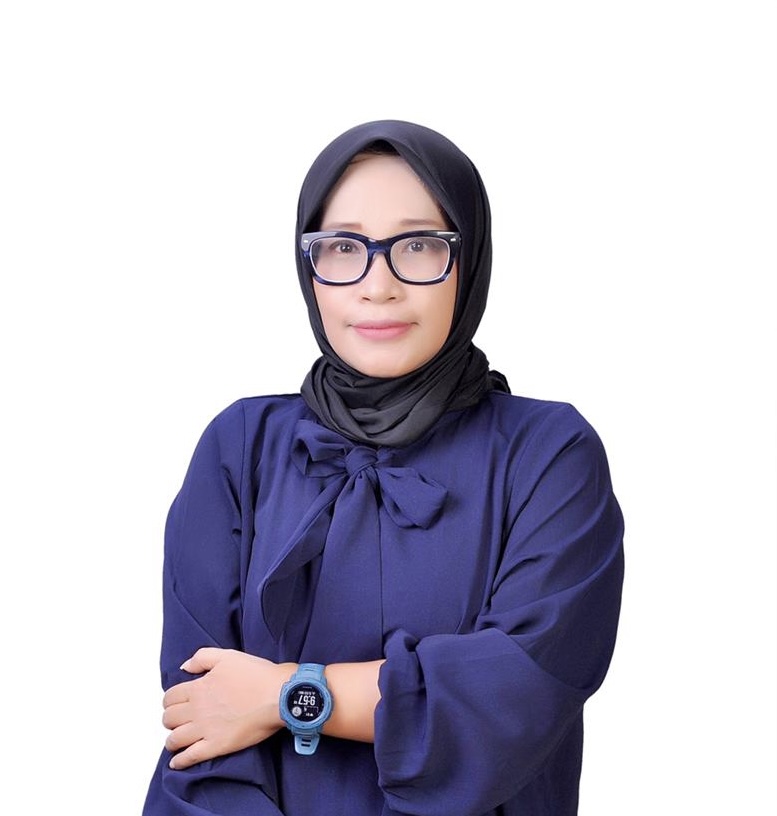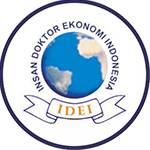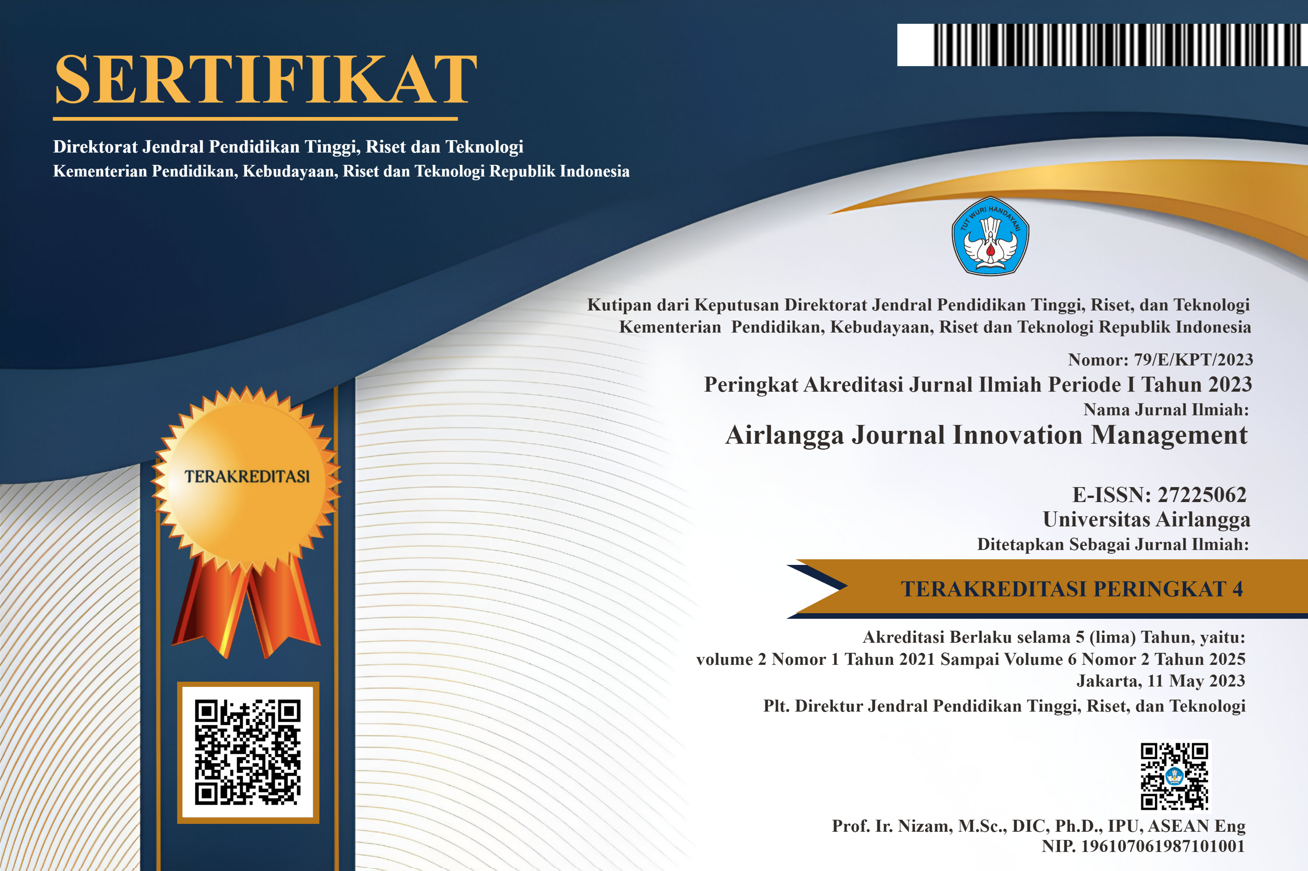The Influence of Factors on Students' Financial Management: SEM Approach
Downloads
This study aimed to identify the factors influencing student financial management in the Jakarta Metropolitan Area. The study included 206 Jakarta Metropolitan Area respondents who met the following criteria: active students at Jakarta Metropolitan Area universities aged 17 to 25 years. The study employed the SEM-PLS method as the primary analysis approach. The results indicated that several factors showed positive and negative correlations on student financial management in the Jakarta Metropolitan Area. Specifically, self-control and financial literacy, which are internal factors, influenced financial management, while allowances and good lifestyle, which are external factors, had no influence. These findings suggest that individuals tend to manage their finances effectively when equipped with a thorough understanding of financial principles and strong self-control. The results of this study offer significant practical implications for the Jakarta Metropolitan Area government in designing strategies to increase financial inclusion more effectively. This study emphasizes the importance of self-control and financial literacy as the main factors affecting financial management skills among college students, and lifestyle factors and the amount of pocket money have no significant effect. Furthermore, financial institutions can use these findings to develop better financial products to meet consumers' preferences for sound financial principles. By providing a better understanding of the factors influencing financial management, this research can contribute to more responsible, sustainable, and compliant financial management within society.
Al-Banna, H. (2019). Muslim Customer Behavior In Halal Food Online Purchasing. Journal of Islamic Monetary Economics and Finance, 5(3), 517–540.
Chen, C. C., Hsiao, K. L., & Wu, S. J. (2018). Purchase intention in social commerce: An empirical examination of perceived value and social awareness. Library Hi Tech, 36(4), 583–604. https://doi.org/10.1108/LHT-01-2018-0007
Derasit, Z., Shariff, S. S. R., Hamid, N. A. A., Sarwani, N., & Shaharuddin, W. N. S. (2020). Exploratory factor analysis in determining consumer awareness toward halal cosmetics. Malaysian Journal of Consumer and Family Economics, 24(S2), 46–59.
Fauziana, H., Wardhana, A. K., & Rusgianto, S. (2022). The Effect of Education, Income, Unemployment, and Poverty toward the Gini Ratio in Member of OIC Countries. Daengku: Journal of Humanities and Social Sciences Innovation, 2(2), 181–191.
Fedorko, I., Bacik, R., & Gavurova, B. (2021). Effort expectancy and social influence factors as main determinants of performance expectancy using electronic banking. Banks and Bank Systems, 16(2), 27–37. https://doi.org/10.21511/bbs.16(2).2021.03
Ghifara, A. S., Iman, A. N., Wardhana, A. K., Rusgianto, S., & Ratnasari, R. T. (2022). The Effect of Economic Growth, Government Spending, and Human Development Index toward Inequality of Income Distribution in the Metropolitan Cities in Indonesia. Daengku: Journal of Humanities and Social Sciences Innovation, 2(4), 529–536.
HC, R. H. K., & Gusaptono, R. H. (2020). The Impact of Financial Literacy on Investment Decisions Between Saving and Credit: Studies on Sharia Bank Customers in the Special Region of Yogyakarta. Journal of Economics and Business, 3(4). https://doi.org/10.31014/aior.1992.03.04.291
Iman, A. N., Sukmana, R., Ghifara, A. S., & Wardhana, A. K. (2022). The Effect of Zakat Collection, Company Age, and Company's Total Assets on Financial Performance of Sharia Banking in Indonesia 2019-2020. Economic Education and Entrepreneurship Journal, 5(2), 217–224.
Iman, A. N., Wardhana, A. K., Rusgianto, S., & Ratnasari, R. T. (2022). Venture vs Investment, Which Type of Financing was more Demanded by Agriculture, Forestry, and Aquaculture Sector? Daengku: Journal of Humanities and Social Sciences Innovation, 2(5), 587–595.
Juliansyah, A. F., Putri, A. E., Suryadana, M. L., Endyana, C., & Wardhana, A. K. (2021). Global Muslim Response to Bandung Halal Tourism Branding. International Journal of Applied Sciences in Tourism and Events, 5(2), 197–206. https://doi.org/https://doi.org/https://doi.org/10.31940/ijaste.v5i2.197-206
Kasri, R. A., Haidlir, B. M., Prasetyo, M. B., Aswin, T. A., & Rosmanita, F. (2020). Opportunities and Challenges in Developing Islamic Pension Funds in Indonesia. Etikonomi, 19(2), 311–322. https://doi.org/10.15408/etk.v19i2.16284
Kementerian Pertanian. (2020). Rencana Strategis Kementerian Pertanian 2020-2024. Kementerian Pertanian Republik Indonesia.
Loestefani, V., Poan, R., Suwitorahardjo, B., & Wardhana, A. K. (2022). Service Quality and Product Quality as An Influence on Customer Loyalty at Naturalis Koffie. FIRM Journal of Management Studies, 7(2), 211–236.
Mafruchati, M., Othman, N. H., & Wardhana, A. K. (2023). Analysis of the Impact of Heat Stress on Embryo Development of Broiler: A Literature Review. Pharmacognosy Journal, 15(5).
Mathematics, R. N.-T. J. of C. and, & 2021, undefined. (2021). Issues And Challenges Of Online Shoppingactivities On The Impact Of Corona Pandemic: A Study On Malaysia Retail Industry. Turcomat.Org, 12(10), 7682–7686. https://www.turcomat.org/index.php/turkbilmat/article/view/5680
Mendo, A. Y., Singh, S. K., Yantu, I., Hinelo, R., Bokingo, A. H., Dungga, E. F., Juanna, A., Wardhana, A. K., Niroula, B., & Win, T. (2023). Entrepreneurial leadership and global management of COVID-19: A bibliometric study. F1000Research, 12(31), 31.
Narli, N., & Oner, Z. H. K. (2018). Implications of Financial Literacy on Women Entrepreneurship in Turkey. ICGR 2018 International Conference on Gender Research, 255.
OJK. (2021). Perkembangan Industri Keuangan Non Bank di Masa Pandemi. Ojk.Co.Id.
Oppi, C., & Galizzi, G. (2024). Gender"responsive budgeting for public value creation: Insights from higher education. Financial Accountability & Management, 40(1), 85–104.
Pratiwi, A. C., Wardhana, A. K., & Rusgianto, S. (2022). Application of Vector Error Correction Model on Macroeconomic Variables toward Changes in the Composite Stock Price Index. Daengku: Journal of Humanities and Social Sciences Innovation, 2(2), 219–229.
Qosim, N., Ratnasari, R. T., Wardhana, A. K., Fauziana, H., & Barkah, T. T. (2023). Eight Years of Research Related to the Green Sukuk in the Global Stock Exchange Market to Support the Implementation of SDG: A Bibliometric Review. Journal of Islamic Economic and Business Research, 3(2), 161–180.
Rahman, I., Ratnasari, R. T., & Wardhana, A. K. (2022). Effect of Certificate of Bank Indonesia Sharia and Indonesian Bank Seven Days Repository Rate to Inflation Ratio in Indonesia During Covid-19 Pandemic. Economic Education and Entrepreneurship Journal, 5(1), 157–174.
Rahman, M. S., Hossain, M. A., Hoque, M. T., Rushan, M. R. I., & Rahman, M. I. (2021). Millennials' purchasing behavior toward fashion clothing brands: influence of brand awareness and brand schematicity. Journal of Fashion Marketing and Management: An International Journal, 25(1), 153–183.
Rashid, N. K. A., Sulaiman, N. F. C., Anang, Z., Possumah, B. T., Muhamad, S., Sa'at, N. H., Hasan, F. A., & Wahid, H. (2021). Survey dataset on the level of sustainable consumption of Malaysian households from the perspective of income and consumption expenditure. Data in Brief, 35, 106743. https://doi.org/10.1016/j.dib.2021.106743
Ryandono, M. N. H., Permatasari, S. A., & Wijayanti, I. (2019). Business behavior in an islamic perspective: Case study of muslim woman entrepreneurs in Ikatan Wanita Pengusaha Indonesia (IWAPI). 12th International Conference on Business and Management Research (ICBMR 2018), 154–159.
Sulaiman, A. I., & Ahmadi, D. (2020). Empowerment communication in an islamic boarding school as a medium of harmonization. Jurnal Komunikasi: Malaysian Journal of Communication, 36(4), 323–338.
Supriyati, & Bahri, R. S. (2020). Model Design of Accounting Information Systems for Village Owned Enterprises (BUMDes). IOP Conference Series: Materials Science and Engineering, 879(1). https://www.scopus.com/inward/record.uri?eid=2-s2.0-85091364746&doi=10.1088%2F1757-899X%2F879%2F1%2F012093&partnerID=40&md5=39b677ce3e9c1cfab09e4d5bbba2f49e
Tarlani, & Sirajuddin, T. (2020). Rural development strategies in Indonesia: Managing villages to achieve sustainable development. IOP Conference Series: Earth and Environmental Science, 447(1). https://www.scopus.com/inward/record.uri?eid=2-s2.0-85082571620&doi=10.1088%2F1755-1315%2F447%2F1%2F012066&partnerID=40&md5=70cd6cd0232bb45f586c134f1e3ffbd5
Trisno, B., & Vidayana. (2023). Understanding herding behavior among Indonesian stock market investors. E3S Web of Conferences, 426. https://doi.org/10.1051/e3sconf/202342601088
Wardhana, A. K. (2021). The Application of Waqf and Endowment Fund Based on the Principles in the Sharia Maqashid Pillar Society. Prosperity: Journal of Society and Empowerment, 1(2), 107–119. https://doi.org/10.21580/prosperity.2021.1.2.8829
Wardhana, A. K., & Ratnasari, R. T. (2022). Impact of Agricultural Land and the Output of Agricultural Products Moderated with Internet Users toward the Total export of Agricultural Product in Three Islamic South East Asian Countries. Iqtishodia: Jurnal Ekonomi Syariah, 7(2), 11–20.
Wardhana, A. K., Ratnasari, R. T., & Fauziana, H. (n.d.). ISLAMIC INVESTMENT IN INDONESIA BEFORE AND DURING PANDEMIC OF COVID-19: A BIBLIOMETRIC STUDY INVESTASI SYARIAH DI INDONESIA SEBELUM DAN SELAMA PANDEMI COVID-19: STUDI BIBLIOMETRIK.
Widiastuti, T., Ningsih, S., Prasetyo, A., Mawardi, I., Herianingrum, S., Robani, A., Al Mustofa, M. U., & Hady, A. F. (2022). Developing an integrated model of Islamic social finance: toward an effective governance framework. Heliyon, 8(9), e10383. https://doi.org/10.1016/j.heliyon.2022.e10383
Wijayanti, I., Herianingrum, S., & Ryandono, M. N. H. (2020). Islamic Crowdfunding Mechanism to Answer Renewable Energy Investment Challenge in Indonesia. Test Engineering and Management, 83, 3596–3605.
Wijayanti, I., Ryandono, M. N. H., & Petra, D. H. S. P. H. (2021). Financial Inclusion through Zakat Institution: Case Study in Indonesia and Brunei Darussalam. International Journal of Islamic Business and Economics (IJIBEC), 5(2), 128–140.
Zaki, I., Herianingrum, S., Hapsari, M. I., Bayuny, A. F. R., & Wijayanti, I. (2024). Diversifikasi Pengolahan Frozen Nugget, Pengemasan dan Pemasaran Google Bisnis. JILPI: Jurnal Ilmiah Pengabdian Dan Inovasi, 2(3), 1–10.
Zakik, Z., Kamil, A., Prasetyo, A. S., Ryandono, M. N. H., & Wijayanti, I. (2022). Economic development on Madura Island through halal tourism: A business feasibility study. Al-Uqud: Journal of Islamic Economics, 6(2), 289–303.
Zulaikha, S., Hendratmi, A., Sridadi, A. R., Basit, A., Iman, A. N., Wardhana, A. K., Ghifara, A. S., Pratiwi, A. C., Febriyanti, A. R., & Nugroho, A. D. (n.d.). FILSAFAT EKONOMI ISLAM Menjawab Tantangan Peradaban. Zifatama Jawara.
Copyright (c) 2024 Airlangga Journal of Innovation Management

This work is licensed under a Creative Commons Attribution-NonCommercial-ShareAlike 4.0 International License.
- The journal allows authors to hold copyright without restrictions and retain publication rights without restrictions. The author retains the copyright and grants the first publication rights to the journal, with his work simultaneously licensed under the Creative Commons Attribution-NonCommercial-ShareAlike 4.0 International License (CC BY-NC-SA). This license allows others to share the work with acknowledgment of authorship and initial publication in this journal, provided that the work is not used for commercial purposes and that any derivative works must use the same license.
- Authors may enter into additional contractual agreements for non-exclusive distribution of the journal publication version (e.g., uploading it to an institutional repository or publishing it in book form), while still including acknowledgment of the initial publication in this journal.
- Authors are allowed and encouraged to upload their work online (e.g., in an institutional repository or personal website) before and during the submission process. This can support productive scientific exchanges as well as increase citations to published works.

AJIM by UNAIR is licensed under a Creative Commons Attribution-NonCommercial-ShareAlike 4.0 International License.





















